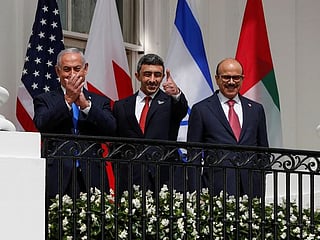US: Strategic dialogue with UAE not dependent on election outcome
‘UAE is a leader in the region and the US is proud of our partnership and friendship’

Dubai: The UAE-US strategic dialogue will continue “no matter the outcome of the US election”, Sean Murphy, Deputy Chief of Mission at the US Embassy in Abu Dhabi, told Gulf News in an exclusive interview. “This dialogue will continue and our bilateral engagement on strategic policy issues will carry on.”
On October 20, the UAE and the United States launched an inaugural strategic dialogue and signed a memorandum of understanding. The initiative, led by senior government officials from both countries, provides a framework to discuss cooperation in eight areas: political partnership; security cooperation; law enforcement and border security; intelligence and counterterrorism; human rights; economic, energy, and commercial partnership; cultural and academic exchanges; and space partnership.
Excerpts from the interview:
Historically, the US has laid great emphasis on its relationship with the UAE, especially during the term of President Trump. What is the main significance of the UAE from the American strategic and Middle East policy perspective?
The UAE is a leader in the region and the US is proud of our partnership and friendship. We enjoy strong bilateral cooperation on the full range of policy issues, and we engage in frank and transparent conversations on difficult issues with mutual respect and understanding. Our relationship has much more potential for leadership and innovation that can influence the region and beyond. We’ve seen that with the historic Abraham Accords, for which we applaud the UAE for its leadership, and we know that that bold step came after many years of close cooperation and trust to align our shared vision for the future.
Would it be fair to say that the close ties the two countries have would continue, no matter the result of the US election? In other words, is support for the UAE in Washington fully bipartisan?
The Strategic Dialogue focuses on US and UAE bilateral equities and opportunities with a view towards our shared long-term goals for strengthening our bilateral relationship. We are fully confident that no matter the outcome of the election, this dialogue will continue and that our bilateral engagement on strategic policy issues will carry on.
The US-UAE strategic dialogue came on the same day as US officials accompanied UAE ministers to Israel, who were on the first diplomatic trip to the country. Was this intentional, to underscore US involvement in the Abraham Accords?
There is so much happening in our relationship right now – it’s truly a dynamic and historic time. The momentum of the Abraham Accords coincides with our long-term efforts to define our policy engagement through the Strategic Dialogue, but it also serves as an indicator of the trust and genuine friendship between our countries. We can work together to promote an innovative approach to long-standing challenges. Through our combined efforts we can achieve lasting peace, prosperity and security.
What does Washington believe will be the effect of the UAE-Israel deal on regional dynamics?
The United States, Israel and the UAE are confident that additional diplomatic breakthroughs with other nations are possible and will work together to achieve this goal. The incorporation of Sudan to the Accords is the most recent evidence of this. The deal provides a foundation for further advances towards regional peace in the future. This agreement will help put the region on a truly transformative path: one of stability, security, and opportunity. Expanded business and financial ties between these two thriving economies will also accelerate growth and economic opportunity across the Middle East.
Strong economic cooperation between Israel and the United Arab Emirates is important to transforming the region, spurring growth, enhancing technological innovation, and forging closer people-to-people relations.
The US-UAE partnership is a burgeoning one. Where do you see these ties headed?
The Strategic Dialogue builds on the strength of our historic partnership and gives us more opportunities for discussions on topics integral to our relationship, and frankly important to the region and beyond. The dialogue serves as an opportunity for frank, productive engagement and cooperation between our governments and will continue to evolve as the relationship and circumstances evolve.






